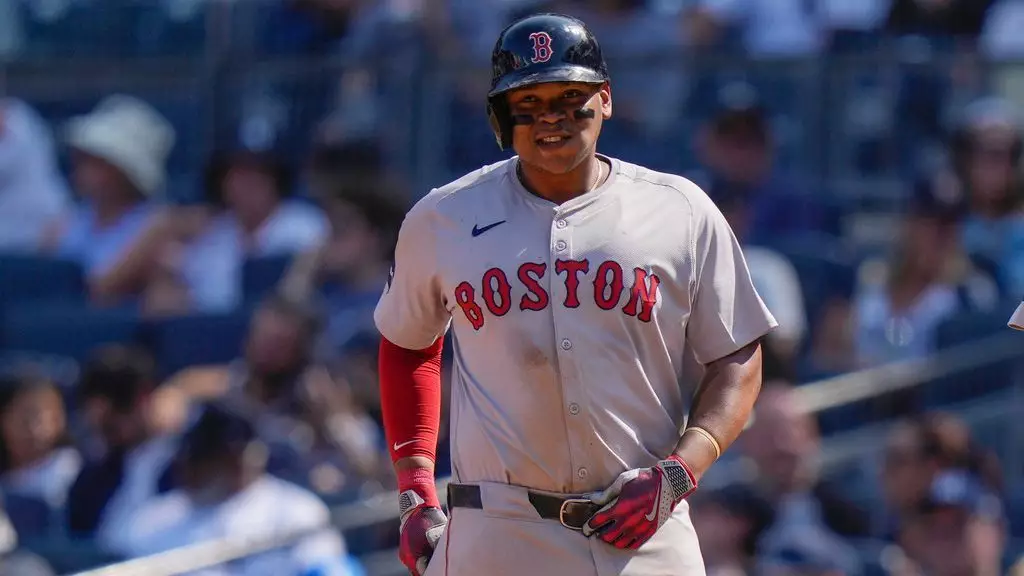Rafael Devers, the ever-resilient designated hitter for the Boston Red Sox, is making headlines not just for his on-field performance, but for his steadfast stance against changing positions during a critical phase of the season. Following the significant injury to teammate Triston Casas, whose season was abruptly ended due to a ruptured knee tendon, the Red Sox brass approached Devers with a proposal that could disrupt his routine and focus. Position switches in baseball, particularly at the major league level, can upset a player’s rhythm and confidence. Devers’ reaction sheds light on the complexities at play—not only for him but also for a team in need of stability amidst uncertainty.
Devers’ reluctance to transition to first base is not merely personal preference; it is rooted in a well-founded belief about the nature of professional athletics. Baseball aficionados understand that adjusting to a new position requires not only physical skills but also a psychological acclimatization. Swapping from third base to designated hitter had its own tribulations; for a player like Devers, who has established himself as a force at the plate, there is an inherent risk in uprooting a tried-and-true setup.
Trust and Commitment
The dialogue with Red Sox General Manager Craig Breslow illuminated a larger issue surrounding player management within the franchise. Devers emphasized that he had been assured of his DH role and that a position change like the one proposed could undermine that commitment. In a climate where players often feel the pressure of performance, Devers’ assertion serves as a clarion call for greater loyalty from management.
Breslow, a respected figure in the organization, should understand better than anyone the difficulties of juggling multiple roles in one season. Devers pointedly remarked, “Changing positions isn’t easy.” This highlights a belief held by many professional players: that organizations owe it to their athletes to honor commitments made during negotiations and strategy discussions. If players cannot count on management to support them in maintaining their roles, how can they nurture their skills and evolve as athletes?
A Team’s Identity at Risk
In the larger context of the Red Sox season, the potential of Devers playing first base prototypes a dangerous precedent. With the current talent pool for first basemen consisting of Romy Gonzalez and Abraham Toro, the conversation naturally extends to whether the team is prepared to invest in a market solution rather than relying on those who might not provide the desired output. Devers’ suggestion for management to actively seek an additional player is not just prudent; it’s an invitation to reinforce the team’s identity without compromising his own.
The delicate balance between player expectations and organizational needs can lead to a disconnect that results in unrealistic demands. By standing firm, Devers is not only advocating for himself but also cautioning against a lack of foresight in the team’s approach to roster management. The Red Sox need a cohesive strategy that mirrors the collective mindset instead of relying on haphazard adjustments prompted by injury.
Branding and the Future of Devers
Devers is cognizant of his value—not just on the field but also in brand and marketability. Adapting to a new role at this stage in his career could dilute the brand he has worked so hard to build. Elite players are often defined by their specialization, and Devers has firmly established himself in the DH role, flourishing within that framework. His insistence on not migrating to first base is ultimately a decision that shapes not just the rest of his season, but potentially his trajectory in the league.
In a sport where history is made on the basis of defined roles and player legacies, Devers is exerting his agency. As he stated, he wants to avoid being “an in-between,” embodying the very essence of how players can assert their rightful positions amidst the churn of a challenging baseball season. For every management decision, there is a human element that must be recognized—one that, when ignored, can lead to a fragile and fragmented team dynamic.
While some may perceive Devers as rigid or stubborn, his steadfast commitment may very well be what holds the delicate fabric of the Red Sox together during turbulent times.

